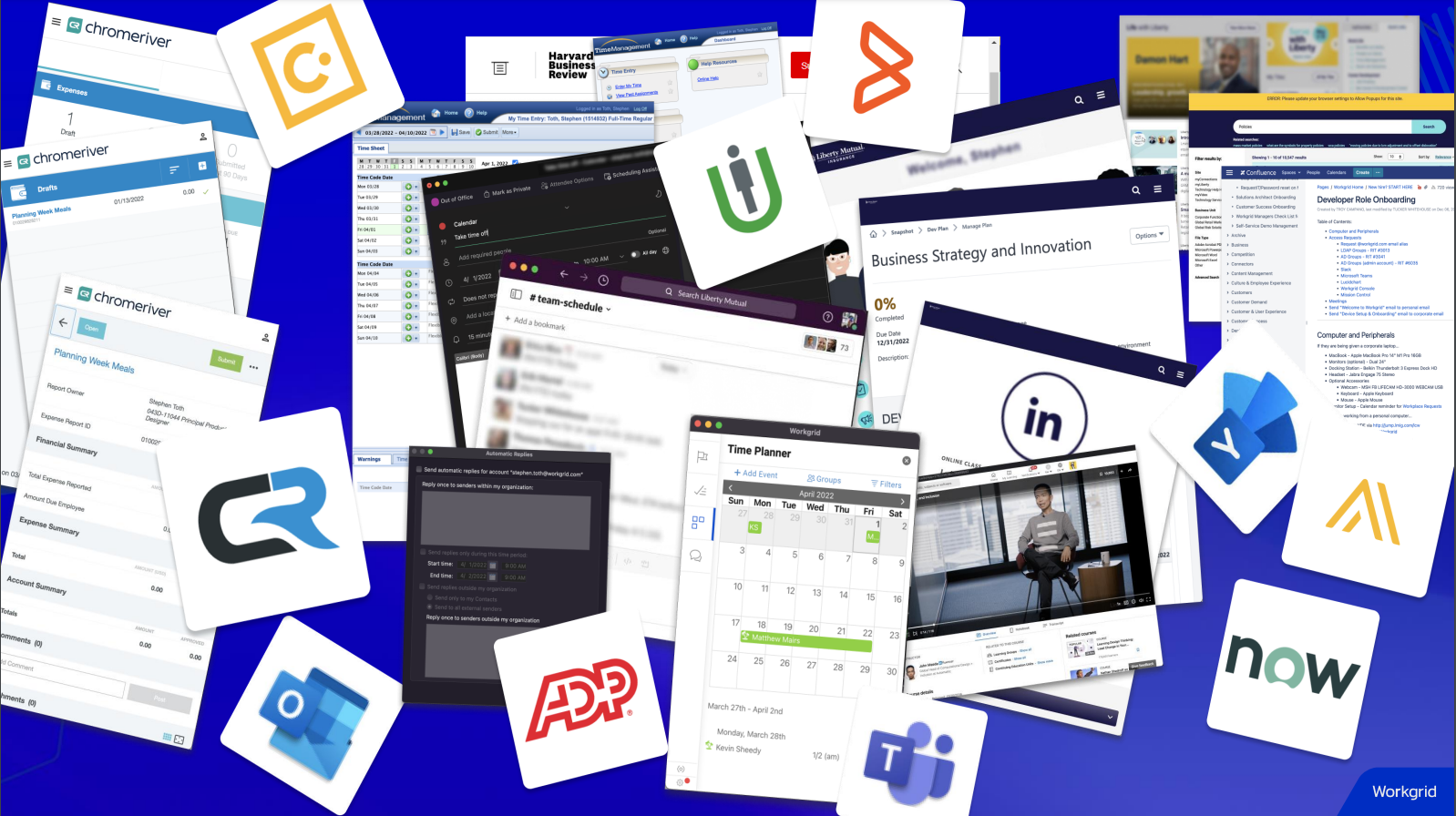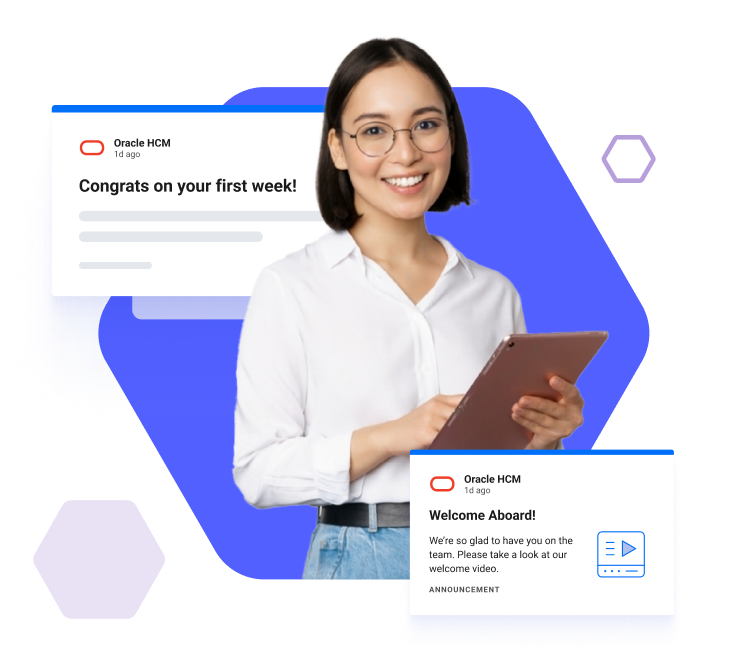The Evolving Role of Human Resources
The role of HR has changed dramatically over the years. It isn’t simply about talent acquisition, performance management, and benefits administration anymore. Today, HR professionals are also tasked with improving employee experience, including delivering modern digital tools to simplify processes, increase productivity, and help improve the employee experience.
The problem, however, is that the typical HR technology landscape for employees is fragmented and causes dissatisfaction at a time when the quality of the employee experience in the workplace is a main priority.

The Current State of the Digital Employee Experience
It goes without saying that HR solutions are chosen in good faith for being the best in their class, with powerful functionality designed to help workers be more productive, better informed, and highly engaged. But there’s a downside to having a variety of pointed solutions. No matter how good they are, all those disparate solutions add up to a disjointed experience for employees.
When employees are forced to navigate a maze of different systems every time they need to find information or complete routine tasks — in the case of HR that involves career and learning management, compensation, time management, payroll, etc. — their ability to find information quickly and focus on meaningful work is severely impacted.
It’s bad enough for productivity, but it’s also a problem for engagement. Meaningful work significantly outranked both work/life balance and getting a raise in terms of importance to workers as cited on Forbes.com.
It’s not just a problem for employees but also for HR staff. The more HR systems and complicated workflows that exist, the higher volume HR help desks face with rising call and email volumes, boxing staff into the corner of being perpetually reactive to employee needs, with little or no time to focus on strategic and meaningful work.

How can Conversational AI Drive Transformation for HR?
Conversational AI is revolutionizing the digital workplace by simplifying communication and enhancing productivity. With intuitive interfaces and natural language processing capabilities, conversational AI takes form in AI assistants that can automate tasks and provide employees with instant access to the information they need.
AI-powered chatbots, or conversational AI assistants, leverage advanced natural language processing (NLP) techniques to facilitate human-like interactions. These AI-powered chatbots possess the ability to understand context, learn from previous interactions, connect across digital workplace technology, and provide personalized responses. By simulating natural conversations, conversational AI enhances the employee experience by enabling a more fluid and intuitive interaction.
With the help of artificial intelligence, answers to questions are summarized across a collection of sources, searching through business systems, documents, and knowledge bases for answers. Unlike traditional chatbots that rely on pre-defined Q&A criteria, conversational AI assistants can not only better understand user requests but can intelligently extract more information from digital workplace technology, often seamlessly combining tasks and information within the conversational interface.
There is a range of opportunities for conversational AI to help improve the experience across HR. Let’s look at a few examples…
Learning Management
Finding creative ways to upskill workers and effectively distribute content related to learning opportunities is increasingly challenging as workers are busier and more overwhelmed with information than ever before. Employees are interested in learning about ways to advance their skills, but they simply don’t have the time to seek that kind of information out. Unfortunately, existing solutions require them to do just, which means oftentimes employees don’t dedicate the time to create learning and upskilling journeys.
AI Assistants can improve the efforts to upskill employees and facilitate career advancement by delivering a more effective learning management experience by proactively delivering relevant, targeted, and personalized learning opportunities and content based on employees’ skills, roles, or career path goals for instance.
By helping employees understand what available opportunities might be appropriate for their career path, workers can more easily take advantage of new career opportunities, keeping them engaged and increasing the likelihood that they’ll stay with the company over the long term.
Furthermore, with conversational AI, an employee could ask an AI Assistant about upcoming training opportunities or help the employee find training opportunities about a specific topic.

HR Automation
AI Assistants can help employees perform common functions and tasks when it's convenient for them in a modern interface, keeping them focused, reducing frustration, and increasing productivity for employees and HR staff alike.
Using conversational AI, HR tasks such as submitting timesheets, and providing details on benefits such as pay, and time off can all be automated. For example, an AI Assistant can integrate with popular HR systems that manage pay and time off, allowing employees streamlined access to time off and pay information via the assistant. Employees can simply ask the assistant “What is my time off balance?” or “Show me a copy of my latest pay slip” and the assistant can intelligently provide those details. This use case is especially useful for frontline workers who may not have access to payroll data at their fingertips.
Other advanced use cases also allow assistants to help ensure employees take time off at regular cadences. AI Assistants, such as the Workgrid Assistant can be programmed to proactively nudge and remind employees to take time off when it has been more than two months since their last day off.
HR departments receive a large volume of benefit-related inquiries. An AI Assistant can quickly address these questions without any human intervention.
Performance Management
AI Assistants can transform the experience for common, repeatable processes like performance reviews by creating a unified workflow for the tasks and information to help employees prepare for performance management. For example, an AI Assistant can send employees reminders about quarterly check-ins, effectively guide employees with helpful resources for developing goals, and be available to answer questions for employees.

Improved Communications and Engagement
AI Assistants not only have the ability to proactively send notifications to employees based on behaviors and actions, but AI Assistant also enables business leaders and HR staff the ability to send communications including:
Talent and development-focused reminders such as upcoming workshops, internal job postings, and onboarding communications
Employee appreciation communications that celebrate milestones, anniversaries, and HR initiatives like employee recognition or community service
Organizational announcements such as new hires, strategic plans, surveys, and diversity and inclusion campaigns
This allows HR to drive significant communication and engagement improvements for employees, going beyond the clutter of email. Communications can be facilitated through automated workflows and customized with advanced targeting options. These tools enable HR and communications staff to streamline their work processes effectively.
Intelligent Access to Knowledge
AI Assistants can provide employees 24/7 support around the clock to help answer their questions and find information effortlessly from key business apps - from leave balances to benefit information. AI Assistants today are much more powerful than the chatbots we are used to for HR-related inquiries. AI Assistants can connect directly to your HR systems, documents, and existing knowledge bases to answer employee's queries.
Intelligent assistants utilize advanced Natural Language Processing (NLP) technologies to offer employees AI-powered search capabilities. This enables them to access precise and pertinent information based on their role, location, and other relevant factors. By leveraging AI technologies, these assistants can summarize answers from various sources and provide relevant suggestions.
Onboarding
An AI Assistant can play a crucial role in welcoming new employees by providing onboarding resources and reminders. It helps new hires understand their responsibilities and expectations as they start their journey with the company. The assistant guides them daily, providing clear instructions on the actions they need to take and the information they need to be familiar with.
Furthermore, the assistant continues to support employees beyond the initial 90-day onboarding period, ensuring a seamless transition and ongoing training throughout their entire journey with the company.

Approvals
Approvals are an example of how assistants can help streamline workflows. Within HR, there are various approvals that need to be completed including promotion requests, transfer request requests, and new hire requests. AI assistants that integrate with an HCM system for instance, can trigger notifications to managers when an approval is awaiting their action. The manager can then promptly review and approve or reject the notification right from the assistant. The ability to manage tasks such as approvals is extremely cost-effective and helps eliminate delays in approvals which can be costly.
Employee Wellness & Change Management
Some AI Assistants have the capability to proactively send notifications to employees based on their behavior. These behavior-based notifications can have a significant impact on employee wellness and change management. For instance, AI Assistants can assist in promoting healthy working habits. Here's an example: if an employee has a high number of meetings scheduled within a specific time period, the assistant can alert them to the importance of blocking out time for focused work. Additionally, if an employee hasn't taken time off in over 8 weeks, the assistant can nudge them to take a day off soon, encouraging healthy working habits and preventing burnout.
Behavior-based nudges can also be effective in driving change and achieving better outcomes or KPIs. Let's say your company aims to foster a stronger culture of recognition. In this case, the assistant can nudge employees if it has been a while since they last recognized a colleague, by integrating with a third-party recognition system.
Improving the Employee Experience with an AI Assistant
Powered by conversational AI, Workgrid's AI Assistant is an incredibly promising technology for HR departments. Designed to streamline processes across the entire employee lifecycle, delivering significant time savings for HR staff and a better experience for employees.
It is available where employees work and delivered as a web client that can be installed on any webpage, it is easily accessible via intranets, portals, or collaboration tools including Microsoft Teams and SharePoint.
Get to know the AI Assistant a little better with this clickable guided tour!


